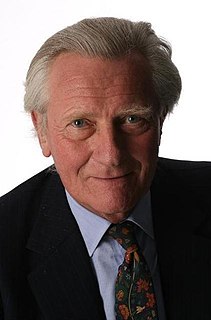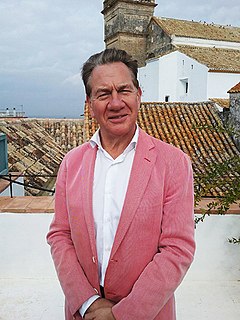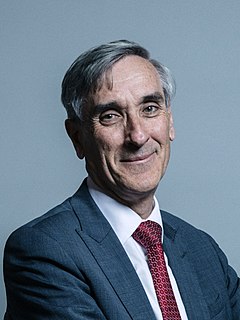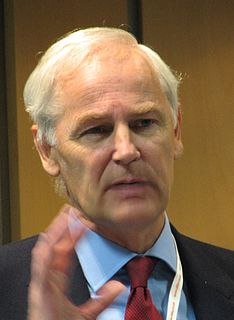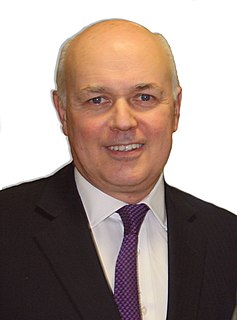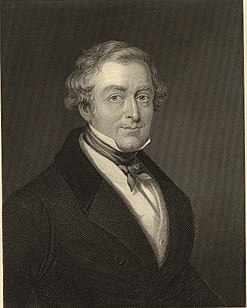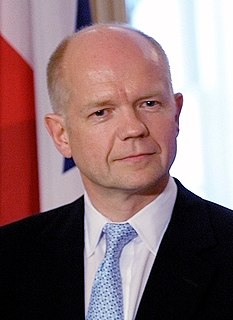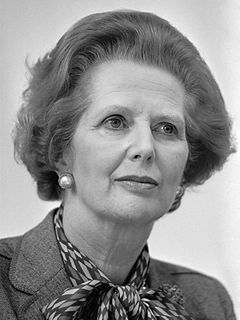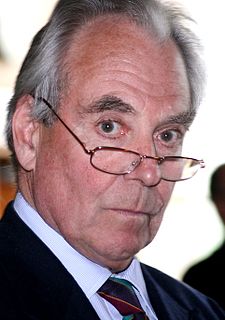This article needs additional citations for verification .(July 2009) (Learn how and when to remove this template message) |
| |||||||||||||
| |||||||||||||
| |||||||||||||
The 1995 Conservative Party leadership election was initiated when the incumbent leader and Prime Minister, John Major, resigned as leader on 22 June 1995, in order to face his critics within the party. On 4 July 1995, he was re-elected, beating the only other candidate, the former Secretary of State for Wales, John Redwood.

The Prime Minister of the United Kingdom, until 1801 known as the Prime Minister of Great Britain, is the head of government of the United Kingdom. The Prime Minister directs both the executive and the legislature, and together with their Cabinet are collectively accountable for their policies and actions to the Monarch, to Parliament, to their political party and ultimately to the electorate.

Sir John Major is a British politician who served as Prime Minister of the United Kingdom and Leader of the Conservative Party from 1990 to 1997. He served as Foreign Secretary and then Chancellor of the Exchequer in the Thatcher Government from 1989 to 1990, and was the Member of Parliament (MP) for Huntingdon from 1979 until his retirement in 2001. Since the death of Margaret Thatcher in 2013, Major has been both the oldest and earliest-serving of all living former Prime Ministers.

Her Majesty's Principal Secretary of State for Wales is the principal minister of Her Majesty's Government in the United Kingdom with responsibilities for Wales. He or she is a member of the cabinet and the head of the Wales Office. He or she is responsible for ensuring Welsh interests are taken into account by Her Majesty's Government, representing the government within Wales and overseeing the passing of legislation which is only for Wales. The current Secretary of State for Wales is Alun Cairns, following his appointment in 2016.
Contents
- Rules
- Candidates and their platforms
- Prominent Conservatives who did not stand
- Campaign
- Ballot
- Consequences
- References
- External links
For some years the Conservative Party had been deeply divided on the issue of the European Union and there had been much speculation each year that Major would be challenged for the leadership during the annual re-election of the leader each November. Many both within and outside the party believed that the constant speculation was highly damaging and so Major took the dramatic step to force an early contest. He announced his decision in a speech in the garden of 10 Downing Street, challenging his party opponents to "put up or shut up". [1]

The Conservative Party, officially the Conservative and Unionist Party, sometimes informally called the Tories, is a centre-right political party in the United Kingdom. The governing party since 2010, it is the largest in the House of Commons, with 311 Members of Parliament, and also has 238 members of the House of Lords, 4 members of the European Parliament, 31 Members of the Scottish Parliament, 11 members of the Welsh Assembly, 8 members of the London Assembly and 7,462 local councillors.

The European Union (EU) is a political and economic union of 28 member states that are located primarily in Europe. It has an area of 4,475,757 km2 (1,728,099 sq mi) and an estimated population of about 513 million. The EU has developed an internal single market through a standardised system of laws that apply in all member states in those matters, and only those matters, where members have agreed to act as one. EU policies aim to ensure the free movement of people, goods, services and capital within the internal market, enact legislation in justice and home affairs and maintain common policies on trade, agriculture, fisheries and regional development. For travel within the Schengen Area, passport controls have been abolished. A monetary union was established in 1999 and came into full force in 2002 and is composed of 19 EU member states which use the euro currency.

10 Downing Street, also known colloquially in the United Kingdom simply as Number 10, is the headquarters of the Government of the United Kingdom and the official residence and office of the First Lord of the Treasury, a post which, for much of the 18th and 19th centuries and invariably since 1905, has been held by the Prime Minister of the United Kingdom.
The Conservative government was also proving unpopular with the British public at the time, trailing the Labour Party in opinion polls and having suffered heavy losses in local elections for three successive years, as well as a poor performance in the previous year's European elections.



